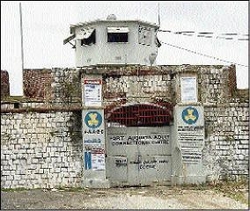Prisoners' children adversely affected by parents' detention
Published: Monday | February 2, 2009

Fort Augusta women's prison in St Catherine. - Ian Allen/Staff Photographer
Omar Lamey, social worker at Youth Unlimited Opportunities, told The Gleaner that when parents are incarcerated, it has a negative impact on their children, as many of these children feel abandoned and the lost of a parental love.
This, he said, is because children grow up looking for reassurance and positive affirmation from parents.
Lamey said children might feel isolated and, as a result, sometimes these children experience more sadness than those who have their parent around. Depending on the gender of the parent who is absent, boys will grow up with a distorted view of what it means to be a man.
Deviant behaviour
He said, "Because of these distorted views, they will get into deviant behaviour and sometimes try to prove their manhood by having many children, or being involved in gangs."
Claudette Pious, head of Children First, in St Catherine, told The Gleaner that it is difficult for these children to cope, as it affects their development. And the socio-economic reality for some of the children is that they have to fend for themselves on a daily basis. It is, therefore, a whole survival game.
Pious said, for the older ones, it means reprisal on the individuals who caused their parents to be in prison. Also, she said, for other cases, the older children now become the sole breadwinner.
"There was a case where a girl had to go into prostitution to support five siblings and herself, in order to purchase food and clothing, and pay rent for the rented house in Portmore where they lived," said Pious.
Support for children
Pious said another major shock to many children who believed that their parents had gone abroad is when someone blurts it out that their parents were in prison. That, she said, can impact them negatively, adding that there should be support for these children in terms of assisting them to go through this period in their lives.
"In one case, there was one boy who was told that his father had died, but eventually learned that the father is in prison," Pious commented.
She recalled time in Spanish Town when many of these boys would try to take on the role of being a bad man, and some would say that they would do anything to go into the prison to join their fathers or uncles.
Pious said, "It took a while for many to change their mindset, ex-inmates were called in to talk to them about life in prison - to tell them that it was not a bed of rose."
The lack of financial support also affected children whose parents are in prison. While some inmates earn an income to support their families, for others there was no earning power to assist their children, who have to rely on the mercies of the communities. And, members of the communities do get frustrated after assisting them for the first three months.
"One of the sad realities is when parents come out of prison after serving a long prison sentence, their children have outgrown them, and at that stage they cannot talk to them, nor are they able to re-socialise themselves with these children," Pious stated.
Pious told The Gleaner that, at Children First, there is a project called Male Awareness, working with children whose parents are in prison. They talk especially with the boys on the matter of going to prison, about parents who are in prison, and the pitfalls of going to prison.
"It is all about resocialising them, and getting them to understand their role, and who is a real man in the society," Pious pointed out.
She commented that even though the Department of Correctional Services had programmes in place to facilitate the continued relationship between inmates and their children, like a family day where children over 18 years old can visit them in prison, more needs to be done.








